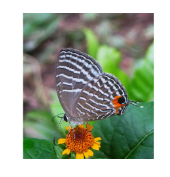12 Nov 2024 14:43:47 pm
Environmental Ecology
Kaziranga National Park
Tags :
Kaziranga National Park

Topic: Protected Areas
Why in the news?
- Kaziranga National Park emerges as second highest butterfly diversity hub in India with 446 species, next to Namdapha National Park in Arunachal Pradesh
Source: The Times of India
About Kaziranga National Park:
- It is situated in the north-eastern part of the country in the districts of Golaghat and Nagaon in the state of Assam.
- It is the single largest undisturbed and representative area in the Brahmaputra Valley floodplain.
- In 1985, the park was declared a World Heritage Site by UNESCO.
- The river Diffalu, a tributary of the Brahmaputra, flows through the National Park area (core/critical tiger habitat), while another tributary, Moradifalu, flows along its southern boundary.
- Its landscape comprises sheer forest, tall elephant grass, rugged reeds, marshes, and shallow pools.
- Flora:
- It is primarily famous for its dense and tall elephant grasses intermixed with small swamplands.
- It also includes an abundant cover of water lilies, water hyacinths and lotus.
- Rattan Cane, a type of climbing palm, is also found here.
- Fauna:
- Many endangered and threatened species like Rhino, Tiger, Eastern swamp deer, Elephant, Buffalo, Hoolock gibbon, Capped langur, and Gangetic River dolphin are commonly found in the habitat.
- It is inhabited by the world\'s largest population of one-horned rhinoceroses, as well as many mammals.

